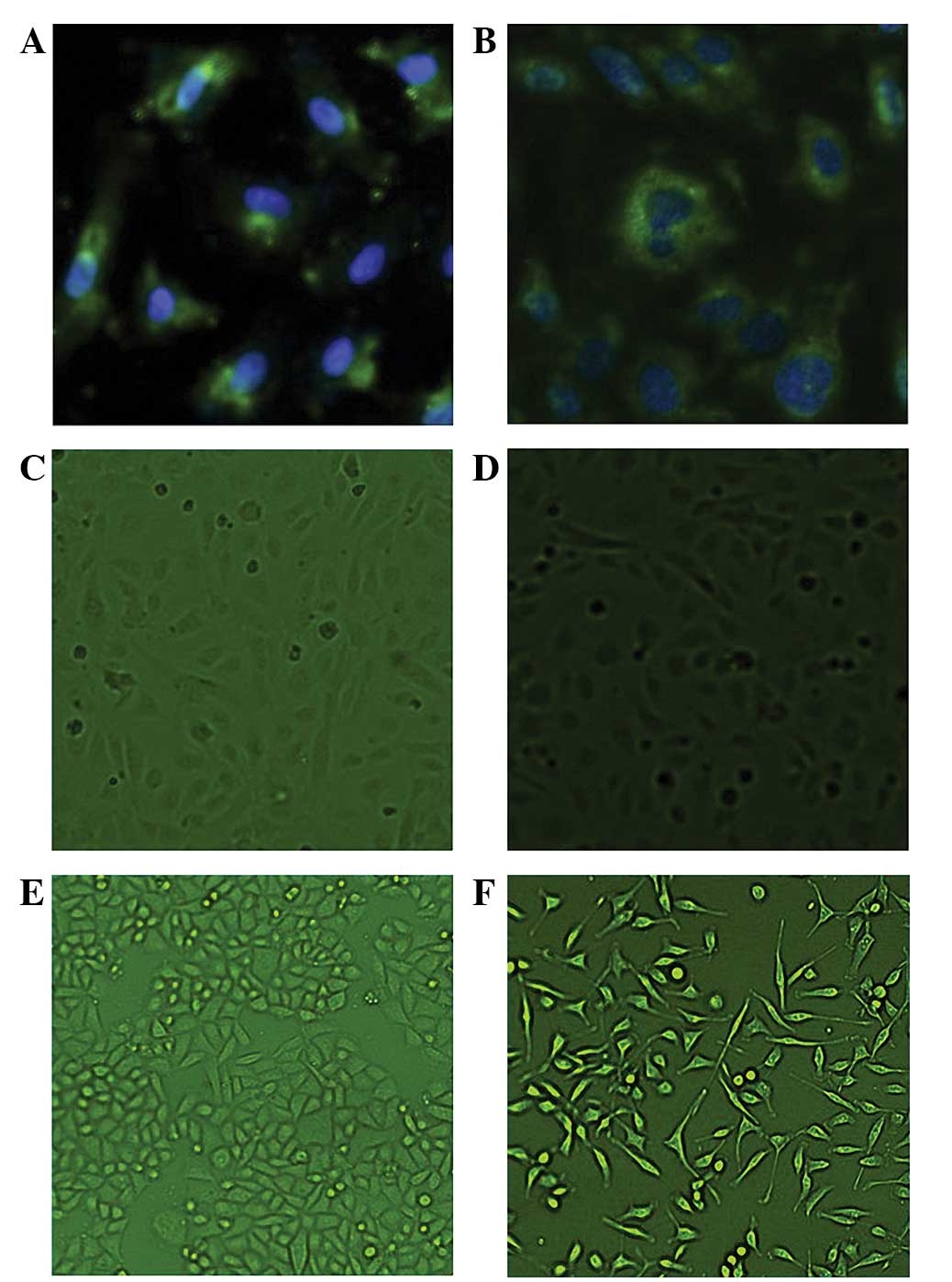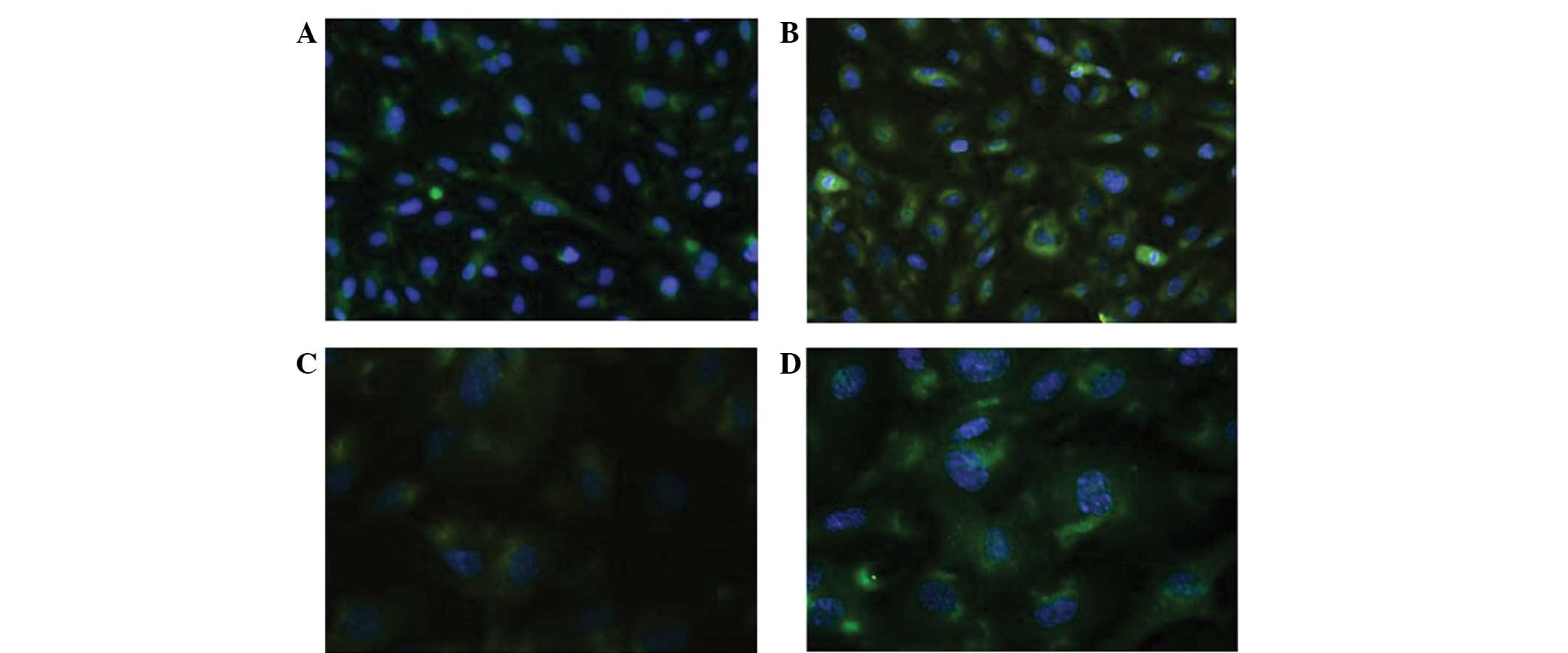|
1
|
Nyberg P, Salo T and Kalluri R: Tumor
microenvironment and angiogenesis. Front Biosci. 13:6537–6553.
2008. View Article : Google Scholar : PubMed/NCBI
|
|
2
|
Fan F, Schimming A, Jaeger D and Podar K:
Targeting the tumor microenvironment: focus on angiogenesis. J
Oncol. 2012:2812612012. View Article : Google Scholar
|
|
3
|
Herbst RS, Heymach JV and Lippman SM: Lung
Cancer. N Engl J Med. 359:1367–1380. 2008. View Article : Google Scholar : PubMed/NCBI
|
|
4
|
Witz IP: Tumor-microenvironment
interactions: dangerous liaisons. Adv Cancer Res. 100:203–229.
2008. View Article : Google Scholar : PubMed/NCBI
|
|
5
|
Galligioni E and Ferro A: Angiogenesis and
antiangiogenic agents in non-small cell lung cancer. Lung Cancer.
34(Suppl 4): S3–S7. 2001. View Article : Google Scholar : PubMed/NCBI
|
|
6
|
Takase Y, Kai K, Masuda M, Akashi M and
Tokunaga O: Endoglin (CD105) expression and angiogenesis status in
small cell lung cancer. Pathol Res Pract. 206:725–730. 2010.
View Article : Google Scholar : PubMed/NCBI
|
|
7
|
Dallas NA, Samuel S, Xia L, et al:
Endoglin (CD105): a marker of tumor vasculature and potential
target for therapy. Clin Cancer Res. 14:1931–1937. 2008. View Article : Google Scholar : PubMed/NCBI
|
|
8
|
Tanaka F, Otake Y, Yanagihara K, et al:
Correlation between apoptotic index and angiogenesis in non-small
cell lung cancer: comparison between CD105 and CD34 as a marker of
angiogenesis. Lung Cancer. 39:289–296. 2003. View Article : Google Scholar : PubMed/NCBI
|
|
9
|
Wang Y, Wang W, Wang S, et al:
Down-regulation of GRP78 is associated with the sensitivity of
chemotherapy to VP-16 in small cell lung cancer NCI-H446 cells. BMC
Cancer. 8:3722008. View Article : Google Scholar : PubMed/NCBI
|
|
10
|
Lee AS: GRP78 induction in cancer:
therapeutic and prognostic implications. Cancer Res. 67:3496–3499.
2007. View Article : Google Scholar : PubMed/NCBI
|
|
11
|
Ballas MS and Chachoua A: Rationale for
targeting VEGF, FGF, and PDGF for the treatment of NSCLC. Onco
Targets Ther. 4:43–58. 2011. View Article : Google Scholar : PubMed/NCBI
|
|
12
|
Baudin B, Bruneel A, Bosselut N and
Vaubourdolle M: A protocol for isolation and culture of human
umbilical vein endothelial cells. Nat Protoc. 2:481–485. 2007.
View Article : Google Scholar : PubMed/NCBI
|
|
13
|
Bai Y, Leng Y, Yin G, et al: Effects of
combinations of BMP-2 with FGF-2 and/or VEGF on HUVECs angiogenesis
in vitro and CAM angiogenesis in vivo. Cell Tissue Res.
356:109–121. 2014. View Article : Google Scholar : PubMed/NCBI
|
|
14
|
Burstein HJ and Schwartz RS: Molecular
origins of cancer. N Engl J Med. 358:5272008. View Article : Google Scholar : PubMed/NCBI
|
|
15
|
Hida K, Kawamoto T, Ohga N, Akiyama K,
Hida Y and Shindoh M: Altered angiogenesis in the tumor
microenvironment. Pathol Int. 61:630–637. 2011. View Article : Google Scholar : PubMed/NCBI
|
|
16
|
McDonald DM and Baluk P: Significance of
blood vessel leakiness in cancer. Cancer Res. 62:5381–5385.
2002.PubMed/NCBI
|
|
17
|
Hashizume H, Baluk P, Morikawa S, et al:
Openings between defective endothelial cells explain tumor vessel
leakiness. Am J Pathol. 156:1363–1380. 2000. View Article : Google Scholar : PubMed/NCBI
|
|
18
|
St Croix BS, Rago C, Velculescu V, et al:
Genes expressed in human tumor endothelium. Science. 289:1197–1202.
2000. View Article : Google Scholar : PubMed/NCBI
|
|
19
|
Hida K, Hida Y, Amin DN, et al:
Tumor-associated endothelial cells with cytogenetic abnormalities.
Cancer Res. 64:8249–8255. 2004. View Article : Google Scholar : PubMed/NCBI
|
|
20
|
Tormin A, Li O, Brune JC, et al: CD146
expression on primary nonhematopoietic bone marrow stem cells is
correlated with in situ localization. Blood. 117:5067–5077. 2011.
View Article : Google Scholar : PubMed/NCBI
|
|
21
|
Santibanez JF, Letamendia A,
Perez-Barriocanal F, et al: Endoglin increases eNOS expression by
modulating Smad2 protein levels and Smad2-dependent TGF-beta
signaling. J Cell Physiol. 210:456–468. 2007. View Article : Google Scholar
|
|
22
|
Lebrin F, Deckers M, Bertolino P and Ten
Dijke P: TGF-beta receptor function in the endothelium. Cardiovasc
Res. 65:599–608. 2005. View Article : Google Scholar : PubMed/NCBI
|
|
23
|
Bergers G and Benjamin LE: Tumorigenesis
and the angiogenic switch. Nat Rev Cancer. 3:401–410. 2003.
View Article : Google Scholar : PubMed/NCBI
|
|
24
|
Dong D, Stapleton C, Luo B, et al: A
critical role for GRP78/BiP in the tumor microenvironment for
neovascularization during tumor growth and metastasis. Cancer Res.
71:2848–2857. 2011. View Article : Google Scholar : PubMed/NCBI
|
|
25
|
Shojaei F: Anti-angiogenesis therapy in
cancer: current challenges and future perspectives. Cancer Lett.
320:130–137. 2012. View Article : Google Scholar : PubMed/NCBI
|
|
26
|
Senger DR, Galli SJ, Dvorak AM, Perruzzi
CA, Harvey VS and Dvorak HF: Tumor cells secrete a vascular
permeability factor that promotes accumulation of ascites fluid.
Science. 219:983–985. 1983. View Article : Google Scholar : PubMed/NCBI
|
|
27
|
Bonnesen B, Pappot H, Holmstav J and Skov
BG: Vascular endothelial growth factor A and vascular endothelial
growth factor receptor 2 expression in non-small cell lung cancer
patients: relation to prognosis. Lung Cancer. 66:314–318. 2009.
View Article : Google Scholar : PubMed/NCBI
|
|
28
|
Rusnati M and Presta M: Interaction of
angiogenic basic fibroblast growth factor with endothelial cell
heparan sulfate proteoglycans. Int J Clin Lab Res. 26:15–23. 1996.
View Article : Google Scholar
|
|
29
|
Przybylski M: A review of the current
research on the role of bFGF and VEGF in angiogenesis. J Wound
Care. 18:516–519. 2009. View Article : Google Scholar
|
|
30
|
Dempke WC and Zippel R: Brivanib, a novel
dual VEGF-R2/bFGF-R inhibitor. Anticancer Res. 30:4477–4483.
2010.PubMed/NCBI
|

















